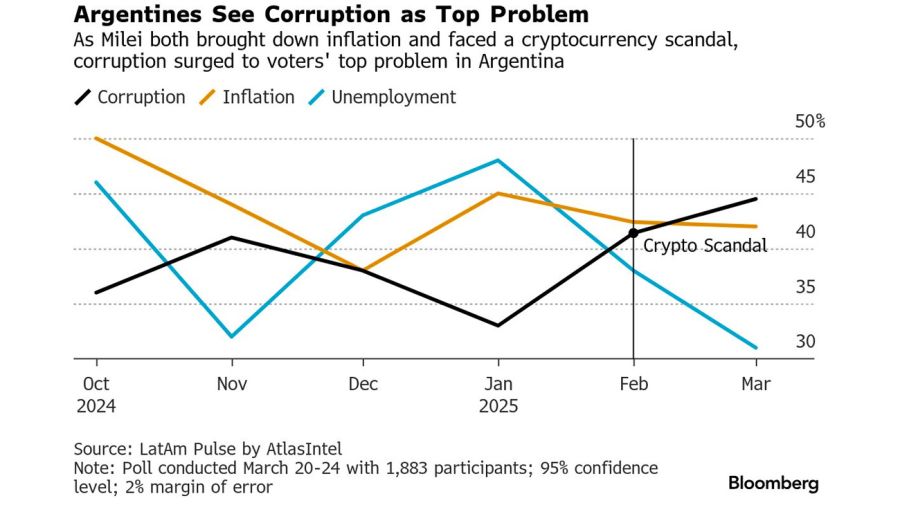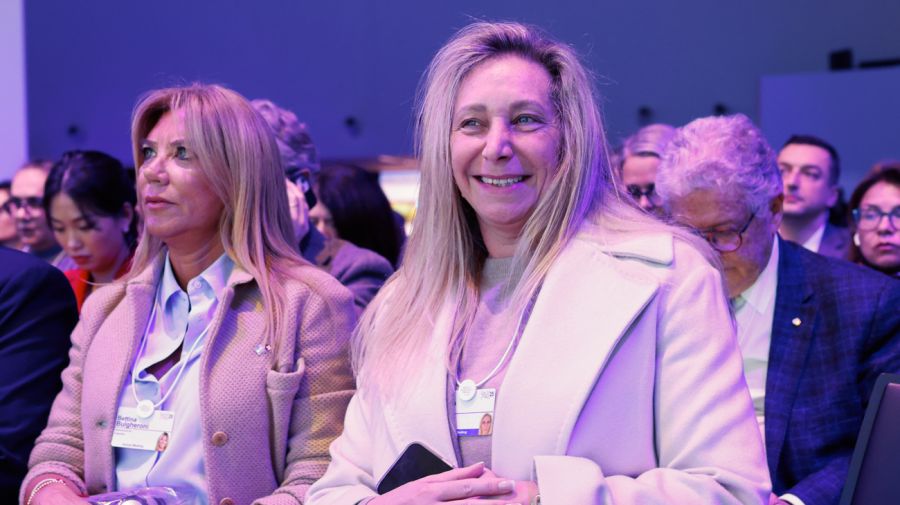By the time Javier Milei sat down for dinner with his guests on the 22nd floor of Le Parc, a luxury skyscraper in Buenos Aires, the cash had already been collected — thick wads of hundred-dollar bills, totaling some US$20,000 in all, stuffed in a bag held by his sister and business manager, Karina Milei.
This was 2023, back when Milei, now Argentina’s president, was still a national deputy and the dinners were a monthly ritual, according to three people with direct knowledge of the meetings. Milei would expound upon the radical economic plan that made him a rising political star as his guests, typically some five to 10 executives from across the business world, dined on bife de chorizo. The cash payment was the cost of access. Typically, one member of the group would hand all of it over.
No restrictions were placed on how Milei could spend the money and no official record of the payments was kept, according to the people, who asked not to be identified discussing politically sensitive matters.
Milei has been open at times about the dinners, telling Bloomberg News after launching his presidential campaign that he saw them as an extension of the paid work he’d long done as an economic consultant. “My time is valuable, I don’t live off of politics,” he said in the February 2023 interview. “If you want to talk to me, sit down, you want a conversation with me, you have to pay.”
Neither Milei nor his sister responded to requests for comment for this story.
Up for debate
The legality of these paid meetings is up for debate. With proper record keeping, government officials are allowed to be paid for services that aren’t linked to their job, and so by this definition, legal experts say, the dinner meetings could potentially be considered consulting work. But it’s illegal to receive money without documentation that shows the source of the payments and the services that were rendered. If any of the executives had business dealings related to the issues on which Milei voted, it could open the door to bribery accusations. No investigations have been opened into the dinners and authorities haven’t accused him of wrongdoing.
Milei’s campaign finance report for his presidential run lists only three individuals who contributed and contains no references to the dinners.
The optics of it all are especially grim at a time when Milei is under scrutiny for having used one of his social media accounts to promote a cryptocurrency that quickly collapsed in February. While his approval ratings remain steady at 47 percent, political corruption has become voters’ top concern, surpassing inflation and unemployment, according to LatAm Pulse, a survey conducted by AtlasIntel for Bloomberg News in March.

“The cryptocurrency episode created, for the first time, a crack in Milei’s image as the purist outsider, distinct from traditional politicians on both the left and the right,” said Yuri Sanches, head of political analysis at polling firm AtlasIntel.
In the United States, expensive campaign dinners with high-end donors are a fundraising staple, but they generate public reports that list how much was donated to the host’s campaign or party. And members of Congress aren’t allowed to accept cash gifts for personal use.
Milei’s dinners raised about US$10,000 each in 2021 and 2022 before climbing to US$20,000 or more in 2023, according to the people. Two of the most prominent organisers of the events were Darío Wasserman, a real-estate executive who is now director of state-owned Banco Nación, and Nicolás Posse, who at that time was an executive of the Argentine holding company Corporación América and then briefly served as Milei’s Cabinet chief, according to two people with direct knowledge of the events.
Wasserman hosted some dinners at his apartment in Le Parc, a residential tower in the waterfront neighbourhood of Palermo. Posse would gather businessmen in private homes, the people said. Contacted by Bloomberg, Wasserman acknowledged that he hosted the dinners, but denied that he or anyone else paid Milei to attend. Posse didn’t respond to messages seeking comment.
In Argentina, a country impoverished by decades of economic stagnation and runaway inflation, US$20,000 is a lot of money — equal to almost two years of wages for the average worker.
As a congressman, Milei did also, of course, receive a pay-cheque, but he gave it all away. Each month, he’d take to YouTube and randomly draw a lucky recipient, in line with his vow to never take money from taxpayers. The publicity stunt boosted his notoriety and gave him a reputation as a maverick politician obsessed with rooting out government waste.
Milei rode that perception all the way to the Presidency, shocking the country’s political class with an upstart campaign that drew surprising support from young people desperate for change. He promised to slash the budget, shore up the currency, lure foreign investment and reignite economic growth.
Milei won over investors during his first year in office by cutting bureaucracy and turning a bloated fiscal deficit into a surplus. Annual inflation slowed to 67 percent in February from almost 300 percent in his first year in office. The economy has begun to expand after years of recession.
Reputation hit
Milei’s reputation took a hit in February, though, when he got ensnared in the cryptocurrency scandal. After he promoted the token, called ‘$LIBRA,’ its value soared, briefly surpassing US$4 billion before collapsing and saddling most investors with losses. Milei denied having made any money off of $LIBRA or having any detailed knowledge of it, saying he was supporting a private initiative that appeared to have good intentions.
The government launched an investigation and political opponents have threatened legal action and vowed to pursue impeachment. It’s unclear where the probe will lead, if anywhere, and what the political repercussions might be for Milei just seven months before Argentina’s midterm elections. Impeachment, moreover, would be unlikely to move forward since it requires two-thirds support in Congress.

To critics, the episode is the kind of thing that can happen when a politician constantly seeks to monetise his position, as evidenced by those expensive dinners he held and the close involvement of his sister. Milei has acknowledged the financial role his sister, who currently serves as a top aide in the administration, has played in his career.
“She handles my finances,” Milei said in a television interview in 2022. “And when I spent too much time on politics, she told me: ‘The numbers don’t add up. Go work, give speeches, because the numbers don’t add up.’”
As a national deputy, Milei made money by promoting businesses on his social media accounts. One such arrangement was with Mauricio Novelli, the founder of N&W Professional Traders, who paid Milei to link to the firm on his Instagram bio page, according to people familiar with the matter.
That relationship ended up leading to the $LIBRA debacle, when Novelli introduced Milei to Hayden Davis, the digital currency entrepreneur who orchestrated the failed launch, at a tech conference in Buenos Aires in October, according to people familiar with the matter. Around the same time, Novelli visited Karina Milei at the Casa Rosada and the Olivos presidential residence outside Buenos Aires multiple times, according to the registrar of visitors.
At the tech forum, a pamphlet sent to VIPs — and reviewed by Bloomberg — listed backstage tickets that included priority access to a closing party for US$50,000. Organisers told prospective buyers that Milei would be present, according to people familiar with the matter.
Davis sat in the front row when Milei spoke at the conference, and three months later Davis and Milei took a selfie at the presidential palace, boasting of big things to come.
In a statement to The New York Times in February, Novelli denied any wrongdoing. Contacted by Bloomberg, Novelli didn’t respond to a request for comment.
related news
by Ignacio Olivera Doll, Bloomberg


























Comments